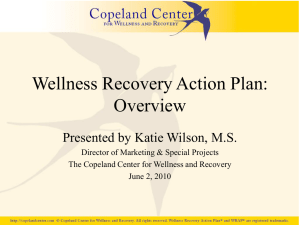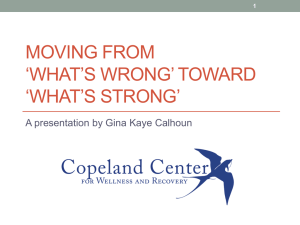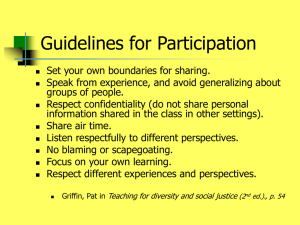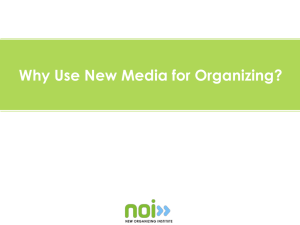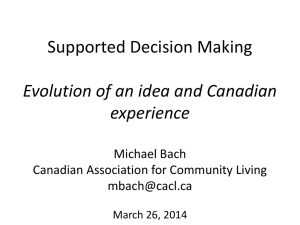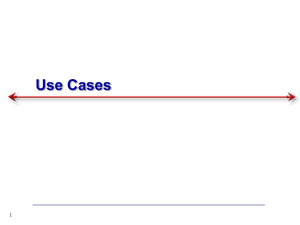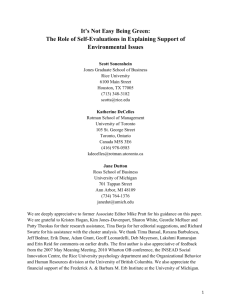What is WRAP?
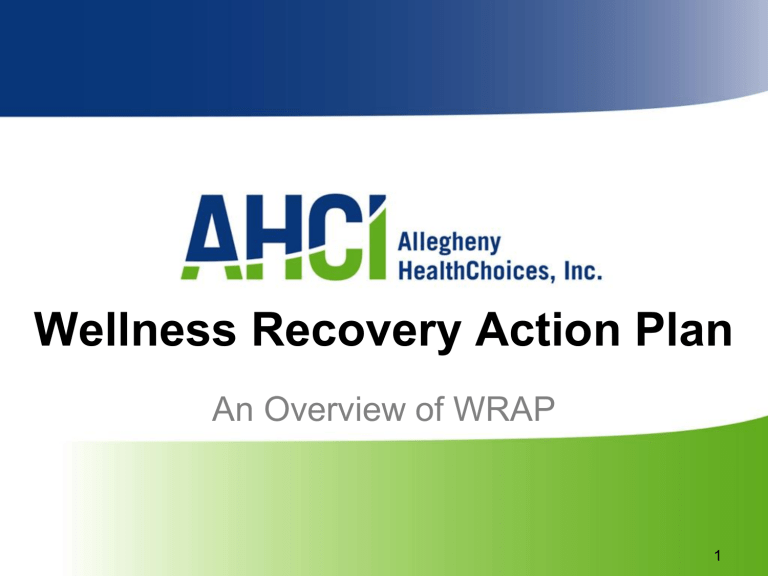
Wellness Recovery Action Plan
An Overview of WRAP
1
Background
Mary Ellen Copeland, creator of
WRAP, first went to a psychiatrist for a deep depression. She fully expected to be fixed so she took his advice without question. She had a negative experience with lithium poisoning. She then began to ask others what they were doing to stay well, and from that information she developed WRAP.
2
Her Key Message Is This:
“ You have to take responsibility for your own well being.”
Mary Ellen Copeland
3
5 Key Recovery Concepts
• Hope
• Personal Responsibility
• Education
• Self-Advocacy
• Support
4
Key Elements of WRAP
• A Wellness Toolbox
• Daily Maintenance Plan
• Identifying Triggers/Action Plan
• Identifying Early Warning Signs/Action Plan
• When Things are Breaking Down/Action
Plan
• Crisis Planning
• Post Crisis Planning
5
Wellness Tools
These are the things you do to keep yourself well, and the things you do to help yourself feel better when you don’t feel well. You may have discovered them by yourself or learned them from others. Remember, most wellness tools are:
• Simple
• Safe
• Free
6
Daily Maintenance Plan
• Describe how you feel when you feel well
• Make list of things you MUST do for yourself every day to keep feeling well
• Write a list of things you SHOULD do
• Write a list of long term goals you
CHOOSE to work towards, and
• Small steps to take
7
Triggers
TRIGGERS are EXTERNAL EVENTS which may cause symptoms or unwanted emotions or reactions, whether from the past or present.
8
Triggers Action Plan
We are going to develop an Action Plan for when Triggers happen to you.
An Action Plan is a list of things you decide ahead of time to do when Triggers cause you to start feeling symptoms or ill.
You can divide your action plan into:
• Things I MUST do when triggers happen
• Things I MIGHT do if they feel right
9
Triggers Action plan
Things I MUST do:
• Do everything on Daily Maintenance
Plan
• Call a supporter and ask them to listen
Things I MIGHT do:
• Talk to counselor or sponsor
• Vigorous exercise
10
Early Warning Signs
EARLY WARNING SIGNS are
INTERNAL FEELINGS in response to triggers and how you perceive them.
Early Warning signs can happen for no reason. This may be because many smaller triggers have happened. Even if you feel like there was no trigger, work through your action plan to deal with these feelings.
11
Early Warning Signs
Action Plan
We are going to develop an Action Plan for when you are experiencing Early Warnings
Signs. Your Wellness Toolbox is an excellent place to find things that help you feel better. You can divide your action plan into:
• Things I MUST do when Early Warning
Signs are happening and
• Things I MIGHT do if they feel right
12
Early Warning Signs
Action Plan
Things I MUST do:
• Do everything on Daily Maintenance Plan
• Call a supporter and ask them to listen
Things I MIGHT do:
• Talk to counselor or sponsor
• Vigorous exercise
13
When Things Are
Breaking Down
This section will be a list of ways that you,
AND OTHERS , can tell when you might need more help and support than when you are well.
These are Feelings and Actions that you have experienced just before a time of
Crisis. This is the last opportunity you have to take action for yourself before Crisis
14
When Things Are
Breaking Down
Some Symptoms that others have experienced are listed below.
Circle the ones that apply to you:
• Feeling very oversensitive or fragile
• Bizarre behaviors
• Paranoia
• Not feeling, numb
• Disassociation
15
When Things Are Breaking Down
Action Plan
When Things Are Breaking Down, it may be necessary to rely on your supporters for more help than usual.
Your Action Plan should have clear instructions for yourself and your supporters in this time. This may be your last chance to make decisions for yourself before Crisis.
16
When Things Are Breaking Down
Action Plan
Below are some steps that others have listed for their Action Plan.
Circle the ones that you think will help you:
• Take 3 days off of work and call Doctor
• Make yourself accountable to someone to do everything on your Daily Maintenance
List and to stay with you through the night
• Give car keys, meds, checkbook and cash to supporter for safe keeping
17
Crisis Plan Part 1:
What I Am Like When I Am Well:
• Describe yourself when you are feeling well.
• You may want to look back at your Daily
Maintenance Plan for ideas about what to put in this section. Descriptive words might include: Talkative
Quiet
Energetic
• Circle the words that are right for you
18
Crisis Plan Part 2: Symptoms
Describe your symptoms that would indicate to others that they need to take over full responsibility for your care and make decisions on your behalf
19
Crisis Plan Part 3: Supporters
• List those people you want to take over for you when symptoms you listed above are present.
• They can be family members, friends or health care professionals.
• Have at least five people on your list of supporters.
• You may want to name some people for certain tasks like taking care of your cat.
20
Crisis Plan Part 3: Supporters
Name:_______________________
Connection/Role:_______________
Phone Number:________________
21
Crisis Plan Part 3: Supporters
There may be health care professionals or family members that have made decisions that were not according to my wishes in the past.
I do not want the following people involved in my treatment care:
Name:_________________________
Why I do not want them involved in my treatment:______________________
22
Settling Disputes
Between Supporters
Describe how you want possible disputes settled between supporters. You may want the majority to agree on your treatment plan or someone to make the determination.
23
Crisis Plan Part 4: Medication
• List Medications you currently take, why you are taking them and which Doctor prescribes them.
• List Meds you would prefer to take…
• List Meds that would be acceptable to you if Meds became necessary and why…
• List Meds that MUST be avoided and you
DO Not want to take and why…
24
Crisis Plan Part 5 and 6:
Part 5: Treatments:
• List treatments that help…
• List treatments that should NOT be used…
Part 6: Community Care/Respite Care
Set up a plan so that you can stay at home or in the community and still get care you need.
25
Crisis Plan Part 7 and 8:
Part 7: Treatment Facilities
• List where you prefer to be treated or
• Hospitalized if that becomes necessary
• List the places you wish to avoid
Part 8: Help from Others
• List things others can do for you
• List what needs done/Who to do it
26
Crisis Plan Part 9 and 10
Part 9: Inactivating The Plan
• Describe symptoms, lack of symptoms or other actions…
Part 10: If I Am In Danger
• If I endanger me or others, I want…
27
Durable Power of Attorney
• You can help assure your Crisis Plan will be followed by signing it in the presence of two witnesses…..
• Date of plan…
• With the help of…
• Signed…
• Attorney…
• Durable Power of Attorney…Phone…
28
Post Crisis Plan:
• Timetable to resume responsibilities…
• I will know I am out of crisis…
• How I would like to feel when…
• Post Crisis Supporters List…
• If discharged, do you have a safe place…
• If not, where can you go…
• I would like ____ to take me home…
• I would like ____ to stay with me….
29
Post Crisis Plan
• Things I need to take care of….
• Things I can have someone else do…
• People and things I need to avoid…
• Signs I may be beginning to feel worse…
• Medical, Legal, Financial issues ….
• People I need to thank…
• People I need to apologize to…
• Signs that post crisis is over…
30
Post Crisis Plan
• Changes in the first 4 sections of my
WRAP
• Changes in crisis plan…
• Changes in post crisis plan…
• Changes in life goals…
• What did I learn from this crisis?
• Are there changes I need to make ….
• If so, how will I make these changes…
31
Timetable for Resuming
Responsibilities
Responsibility_____
Who has been doing this?_____
While I am recovering, ______ can do…
When can I resume this….
32
The Key Message Is This:
“ You have to take responsibility for your own well being.”
Mary Ellen Copeland www.mentalhealthrecovery.com
33
